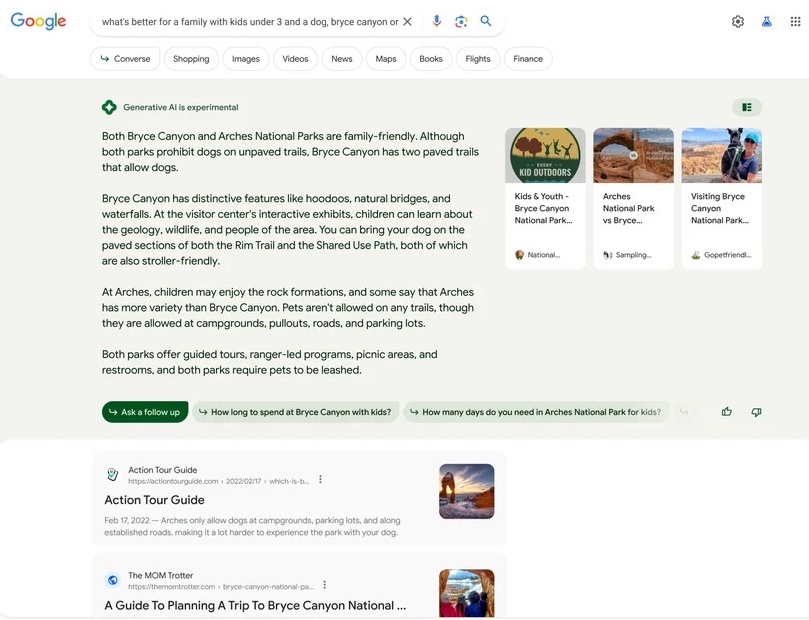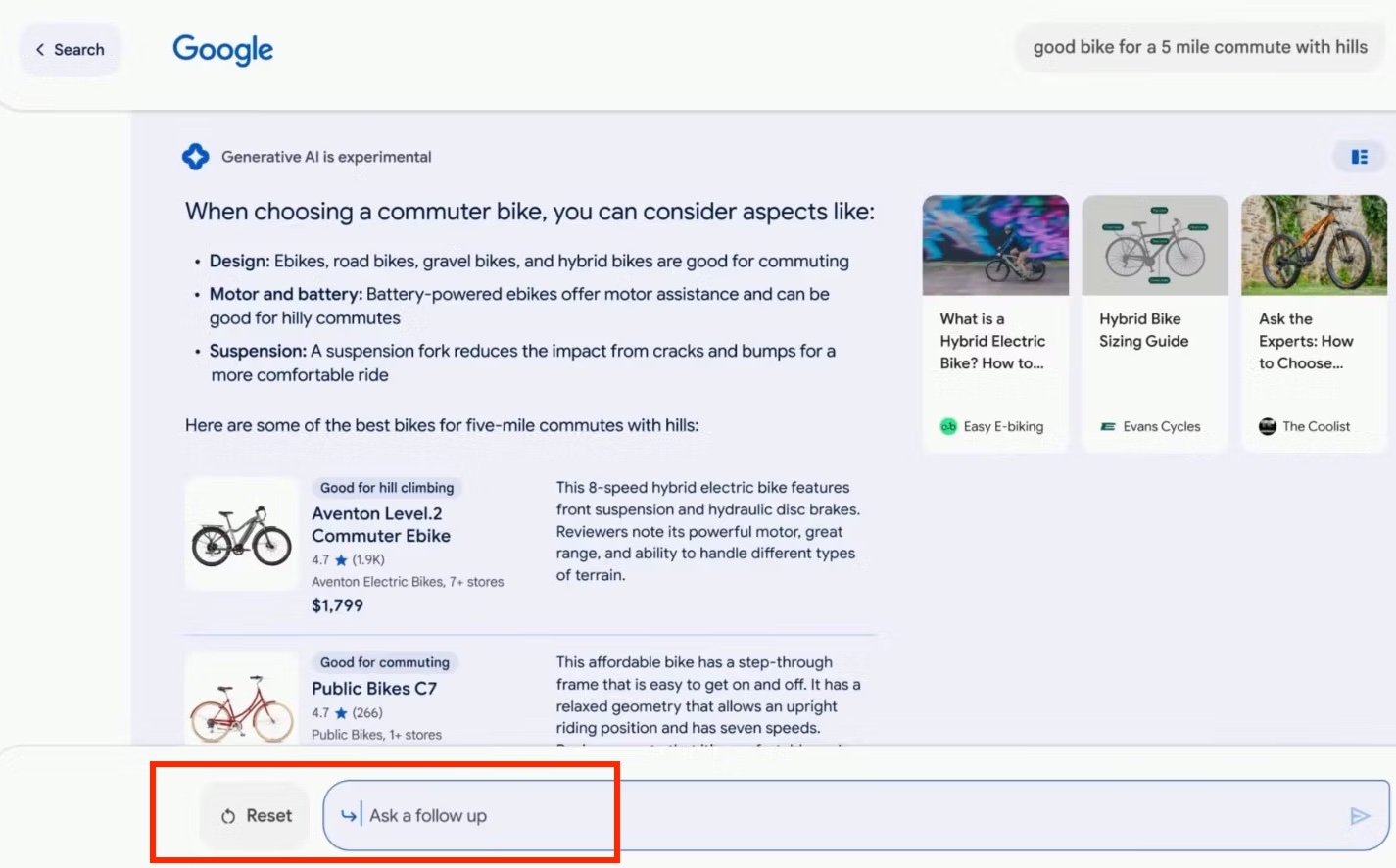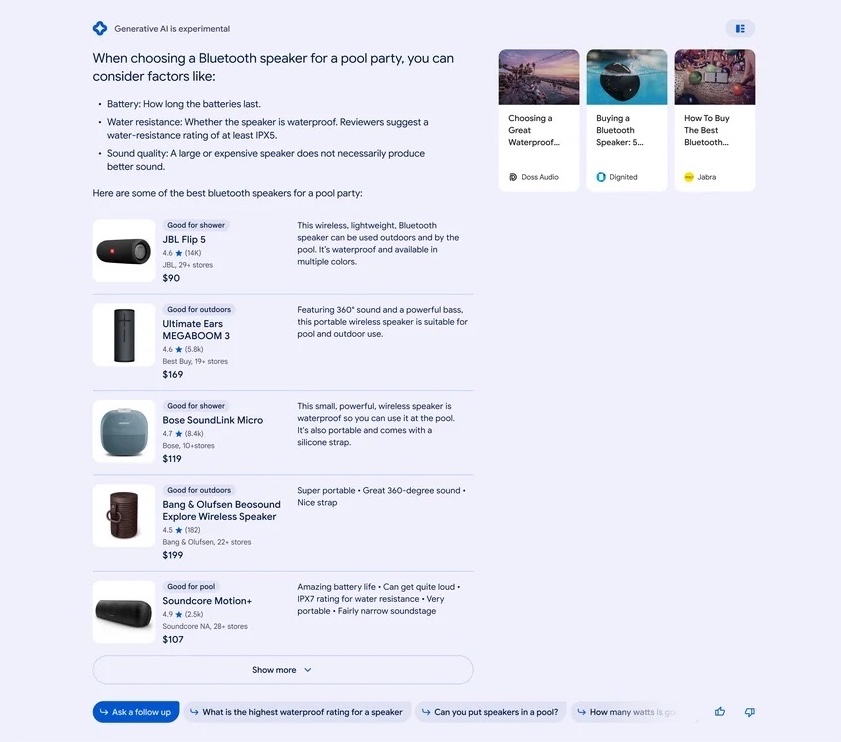Content Marketing
Why You Should Be Working on an AI SEO Strategy
While the high-profile (and slightly embarrassing) rollout of Google Bard marked the search engine giant’s opening salvo in the generative AI war, Google’s announcement that it will incorporate generative AI into search results will likely have a much greater impact on marketers.
The feature uses generative AI to provide detailed responses to queries based on multiple sources. You can then ask follow-up questions for more information or explore the content cited in the response. The new search feature also links sponsored and organic search results below the AI content, preserving the traditional search experience (and the company’s lucrative advertising model).

How Generative AI Will Shake Up Search
While the early results using Google’s Search Generative Experience (SGE) have been mixed (mostly due to its tendency to make factual errors when it comes to providing specific details), there’s no question that generative AI will fundamentally change how people use search engines. DeepMind co-founder Mustafa Suleyman even suggested recently that the “old-school search” experience will no longer exist within ten years thanks to AI innovation.
Here are a few reasons why that could prove to be the case:
1. No More Question Engineering
Getting a decent response from a search engine frequently involves asking the right questions. While search algorithms have gotten very good at identifying the intention behind a search query, they still struggle to provide appropriate results if the question or search terms don’t incorporate the right keywords or phrases.
Generative AI can better determine search intent because it has a deeper understanding of language. Rather than trying to enter terms and phrases the algorithm is most likely to recognize, you can simply ask questions as you would in casual conversation to find the information you’re after.
Even better, you can dig deeper by asking follow-up questions directly instead of endlessly clicking on links that may or may not lead you in the right direction. Since the AI remembers your previous questions, each follow-up question will take your exploration deeper rather than resetting with every new search.

2. More Answers You Actually Want
The top search engine results are a combination of sponsored ads that have paid to rank for specific keywords and websites deemed to be relevant due to a variety of SEO factors (keywords, domain authority, backlinks, site traffic, and so forth).
Clever content marketers and technical SEO experts have used a variety of tactics over the years to get their sites to rank higher in organic searches. In many cases, this leads to repetitive, low-quality, and hard-to-navigate content landing near the top of the search rankings, which only fuels the perception that search results have become less helpful over time.
Since generative AI is trained to provide direct and detailed responses to queries, it allows you to find the information you’re looking for quickly without having to sift through multiple search results or scroll past sponsored content. For instance, Google recently showcased how quickly SGE can help identify the best speaker to buy for a pool party. The AI quickly generated a brief list of important factors to consider, then provided a few product listings along with some helpful sources.

3. More Comprehensive Results
One of the fundamental limitations of search engines is that they can only serve up existing content for results. While the internet contains quite a lot of information, it doesn’t always have the specific details you’re looking for in one place.
Generative AI search integrations can generate original content by drawing upon multiple sources to provide comprehensive answers to search queries. Rather than reading several websites to find the information you’re after, you can get everything in a single, well-crafted response (although it’s always a good idea to fact-check the results).
4. Improved Personalization
Search engines use a combination of geolocation and search history when providing results, but these personalization tools are relatively crude. While they’re great for delivering targeted ads, they don’t build upon the context of previous queries to provide a better search experience.
By referring back to previous searches and conversations, generative AI can provide more accurate and personalized responses. The technology will improve over time at determining your search intent and providing the answers you’re looking for.
How Generative AI Search Will Impact Marketers
As search engines continue experimenting with generative AI, marketing teams must consider how these features impact their SEO strategies. Just as previous updates to search algorithms have forced marketers to adapt, innovations in AI will result in new approaches to developing and sharing content.
Here are a few ways marketers can position their content to thrive in an era of generative AI search:
1. Create Content for Humans, Not Just for Algorithms
Google, for its part, has long taken a stance on how websites can rank higher in search results: create content that is “useful, helpful, original, and high-quality. How that information is produced is less relevant than its ability to demonstrate expertise, experience, authoritativeness, and trustworthiness.
Generative AI language models have been trained to evaluate content based on these criteria. They will serve up what it determines to be the highest quality sites when providing sources and suggestions for additional information. Successful AI SEO strategies should therefore incorporate not just high-ranking keywords and be organized in ways that are easy for search engines to index, but they should also provide information that’s original and offers genuine insights to readers.
2. Focus More on Long-Tail Keywords
In a recent article addressing concerns over Google’s announcement, marketing guru Neil Patel made the case that AI-powered search will make strategies for long-tail keywords more important than ever. That’s because generative AI provides better results with more detailed prompts. As these longer queries become more commonplace, the SEO value of long-tail keywords associated with them will increase as well.
Fortunately, there are several SEO tools that make these longer phrases easier to identify and incorporate into content strategies. General keyword finders like Semrush, Ahrefs, and Ubersuggest can all provide helpful data on long-tail search terms, but more specialized tools like LongTailPro are also available.
3. Utilize AI SEO Tools
While generative content AIs have been drawing most of the media headlines, the development of AI SEO tools has proven just as important for marketers. These tools make it easy to optimize website content for improved SEO results, get AI-driven suggestions and insights, and even generate new content based on real-time data.
The transition to generative AI search will put an even greater premium on SEO performance.
Some popular AI SEO tools to try out include:
- AlliAI: Especially useful for optimizing backend technical SEO, this tool features a Bulk OnPage Optimization feature that allows you to create and implement optimization rules across an entire site.
- INK: Primarily a writing tool, INK can also analyze competitor websites to identify SEO opportunities to help produce content that consistently outranks your rivals.
- SEO.ai: This powerful content tool features AI-powered keyword research capabilities along with competitor benchmarking and SEO optimization options.
- Surfer SEO: One of the earliest AI SEO tools, Surfer SEO can identify potential problems with its auditing features while also continually gathering data to provide weekly insights on keyword usage and content ideas.
The Future of AI SEO Is Coming
As Google continues to incorporate new AI features into its search engine, it will be imperative for marketers to stay ahead of the game by creating original, high-quality content that is appealing to both ordinary readers and generative language models. With flexible AI SEO tools to provide the right data to optimize your content strategy, you don’t have to make a trade-off between those audiences.
Don’t let your content fall behind the revolution in AI marketing technology. Sign up for The Content Strategist newsletter to get the latest updates on how to position your content strategies for success.
Image by NunnyGet better at your job right now.
Read our monthly newsletter to master content marketing. It’s made for marketers, creators, and everyone in between.




